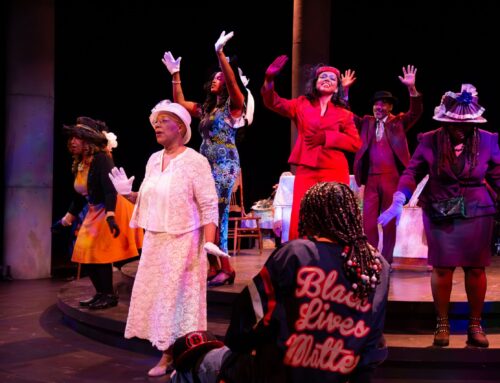 Prudence Payne is a critic on the cusp of dementia. I trembled at the premise and buckled up for PRU PAYNE a Boston Theater Critics CRITICS’ PICK now having its East Coast premiere at SPEAKEASY STAGE directed by Paul Daigneault. As soon as Karen MacDonald hits the stage I know I’m in good hands—her Pru Payne is MASTERFUL. The play by Steven Drukman is a tender and deeply humane look at what happens when a revered, sharp-witted, erudite, public intellectual begins to lose her mind, that which tethers her to her identity and success in the world.
Prudence Payne is a critic on the cusp of dementia. I trembled at the premise and buckled up for PRU PAYNE a Boston Theater Critics CRITICS’ PICK now having its East Coast premiere at SPEAKEASY STAGE directed by Paul Daigneault. As soon as Karen MacDonald hits the stage I know I’m in good hands—her Pru Payne is MASTERFUL. The play by Steven Drukman is a tender and deeply humane look at what happens when a revered, sharp-witted, erudite, public intellectual begins to lose her mind, that which tethers her to her identity and success in the world.
The playwright untethers the audience in the first scene where we meet Pru, who’s been having memory lapses, sitting in a hospital waiting room struggling with a remote which suddenly morphs into a prestigious award she has received; we now find ourselves back at that ceremony as Pru delivers a scathing and hilarious diatribe, mocking the “august assemblage” for bestowing this award –a bit late, she observes, as the first woman to receive it. She lacerates various luminaries from Norman Mailer to Rex Reed (did he actually win a Pulitzer??). She goes on to champion the work of critics who are themselves criticized for merely pronouncing and “reading into” others’ work; but their essential role is to applaud virtuosity where they find it and uphold standards as a “bulwark again barbarians.” MacDonald delivers this speech with the perfect balance of irony, acidity and gravitas.
But rather than descend into a harangue against the inequities of the world and the current begriming of our cultural discourse (Did a presidential nominee really use the word “bullshit” in a stump speech? Or talk about the size of a famous athlete’s genitalia to the roar of the crowd?) the play goes to a kinder, gentler, more meaningful place. As it does, MacDonald calibrates Pru’s mental decline and unexpected awakening with great delicacy and accuracy as she slips in and out of various layers of awareness.
Pru’s son Thomas (De’Lon Grant) commits his mother to a New England clinic where Dr. Dolan (Marianna Bassham) is researching dementia. There in that existential waiting room Pru meets her unlikely match: Gus Cudahy a blue-collar “custodian,” bus driver, and patient well-played by NYPD Blue’s Gordon Clapp.
Clapp manages this tricky role with aplomb. Gus is plain-spoken with a penchant for bottom line, poetic wisdom, never quite losing his ill temper or his working class cred. He can’t believe Pru has fallen for him, but we accept their relationship because of the solid core and integrity of the man, flaws and all. Their first encounter takes place around that pop cultural crossroads, TV, which Gus calls “frikkin’ garbage” and notes that Elvis shot his TV. Pru remembers writing about it and calls it Elvis’s rage against a “morass of mid-brow replication.” But Gus takes the wind out of her cerebral sails and fires back, “Elvis shot his TV. Don’t overthink it.”
That says it all. Soon neither will be able to overthink anything, but what, in the end, will be lost? This is the heart of the play. Pru and Gus flow in and out of time and memory as she struggles to write her memoir, and he struggles financially to afford the clinic. Their respective sons (Gus’s son Arthur is played by Greg Maraio) who it turns out used to know each other, reconnect in a plot line which mirrors that of their parents. Admittedly, this story line was not as dramatically interesting to me and felt somewhat contrived as a mechanism to underscore a theme rather than emerging organically from the action.
Nevertheless, the action with its interplay of parallel narratives and time slippage is subtly and smoothly directed by Paul Daigneault on a simple, malleable set. All of these characters, having dropped their cultural loads, do not lose themselves, but rather find themselves unburdened and able to rediscover parts of themselves they’ve repressed. Their newfound vulnerability allows them to connect as unadorned human beings who find love and companionship in each present moment.
I now wonder what any of this means for critics, artists, bus drivers, any of us– except to say that if the playwright hadn’t written the play, and I hadn’t seen it and written about it, I might not have had this perspective to share with you. What do you think? Let me know after you see PRU PAYNE at SpeakEasy Stage through November 16!







